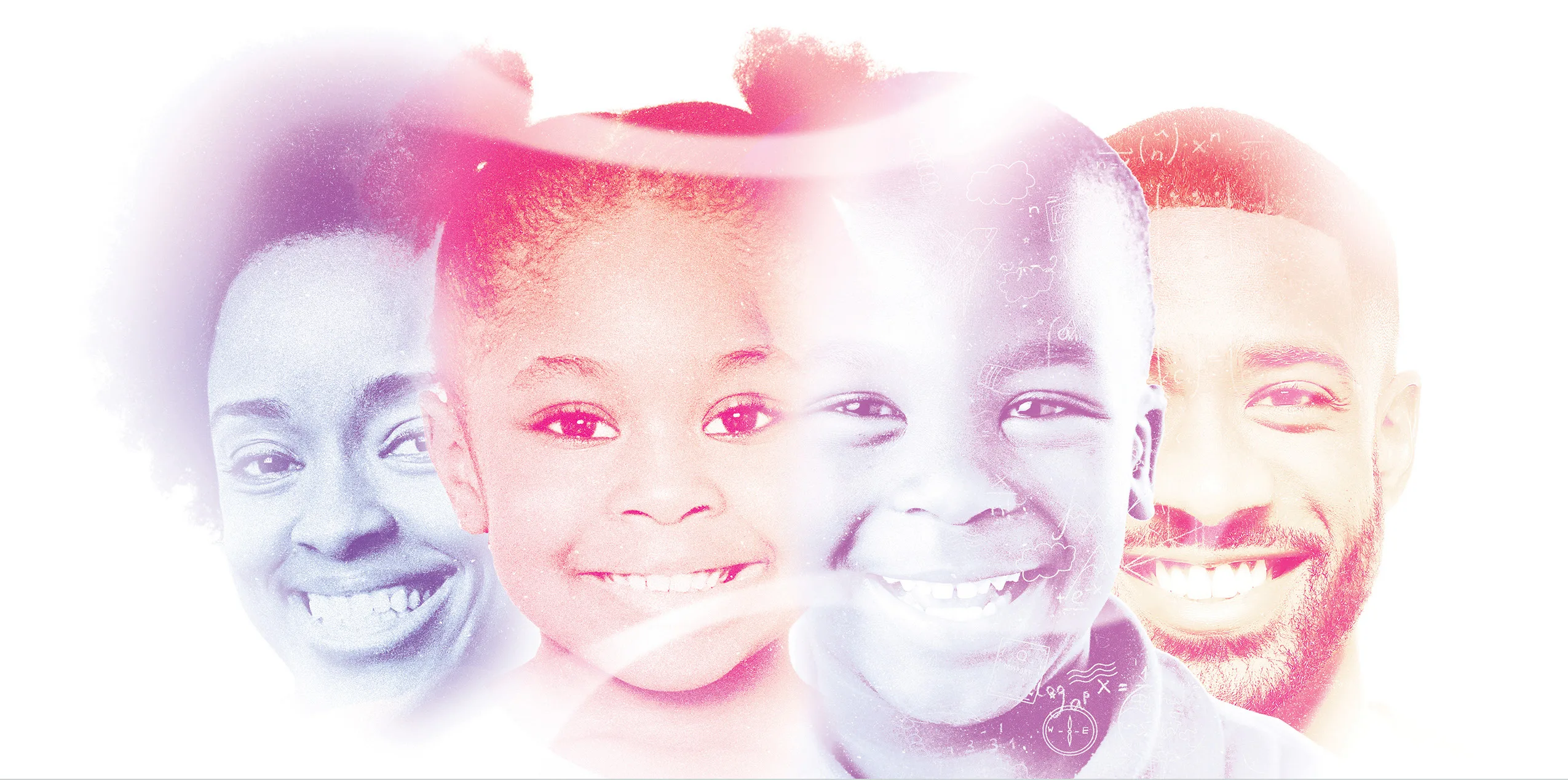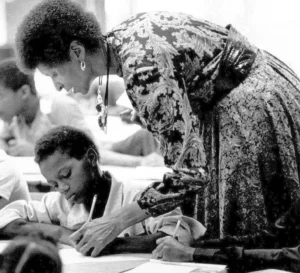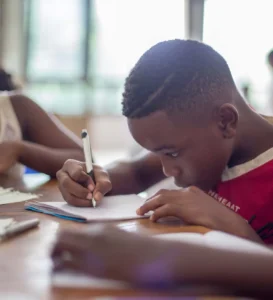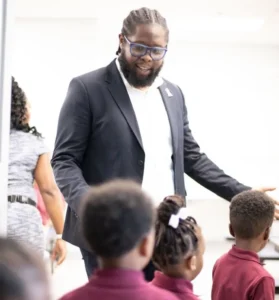
In 1975, veteran public school teacher Marva Collins took $5,000 from her retirement savings to start a modest yet extraordinary private school in Chicago. Collins was tired of watching Black children being mislabeled “disabled” and falling through the cracks of the public school system. So in the brownstone where she lived, she created what we now call a learning pod.

Marva Collins, Westside Preparatory School founder
Westside Preparatory School began with five children, including two of Collins’s own.[footnote]O’Connor, J. J. (1981, December 1). TV:Marva Collins, Unusual Teacher. The New York Times. p. C14. Available at: www.nytimes.com/1981/12/01/arts/tv-marva-collins-unusual-teacher.html[/footnote] It had the feel of the one-room schoolhouse Collins experienced growing up in Alabama, and Collins used a classical curriculum to engage her students. The results were so good, “60 Minutes” came calling, and not long after, the Collins story became a movie starring Cicely Tyson and Morgan Freeman.
Alas, the school did not last. It closed in 2008, the modest tuition too much for too many families.[footnote]Marva Collins School to close. (2008, June 5). ABC7 in Chicago. Available at: Marva Collins School to close | ABC7 Chicago | abc7chicago.com - ABC7 Chicago[/footnote]
A half-century after Collins blazed her trail, though, the Black education entrepreneurs Marva Collins, Westside Preparatory School founder who are heirs to her legacy – and to the unsung legacy of so many other Black educators who created better learning options for Black students – are on the rise.
Education entrepreneurship is having a moment. [footnote]Dry, R., Barlis, L., Nelson, P., Matus, R., McShane, M. Q., Shuls, J. (2022). How Can I Stay In It But Not Stay In it? Leaving a Classroom But Starting a School. Available at: www.reimaginedonline.org/wp-content/uploads/2022/08/White-Paper-Leaving-a-Classroom-But-Starting-a-School.pdf[/footnote]
After decades of frustration with traditional schools, after a pandemic that magnified the in- adequacies and inequities of public education, and now with the rapid expansion of education choice programs in multiple states, education entrepreneurs are remaking public education with a dizzying array of innovative models. These models are ever more customized to the stu- dents they serve, ever more responsive to families who want something different, and, thanks to school choice, easier than ever to sustain and scale.
Black education entrepreneurs are in the thick of this phenomenon.
This report is about them.
It’s a first glimpse into who they are, what motivates them, what models they’ve created, what students they’re serving, and what challenges they face. Our snapshot is based on responses to a survey we sent to Black school founders who are part of a growing directory maintained by Black Minds Matter, a national nonprofit dedicated to the development of high-quality school options for Black students.
The respondents are diverse in terms of curriculum, pedagogy, and school type. They include incredible charter schools like Noble Minds Institute in New Orleans, Pasadena Rosebud Academy in California, and Legends Charter School outside Washington D.C.; highly regarded private schools like Discovery Lane in Maryland and Crossover Prep Academy in Oklahoma; and innova- tive microschools like The Lab School and Eminence Academy in Memphis. There are STEM-fo- cused schools like Anderson Academy of Math & Science in Las Vegas, STEM-based and Afri- can-centered schools like The XYAYX Institute in Brooklyn, and even more eclectic schools like Florida’s Kind Academy, which fuses project- and nature-based learning with flexible scheduling.
These respondents are representative of the broader universe of Black school founders. And the survey advances the work of understanding what policy makers, philanthropists, and other supporters can do to help it expand.
It should surprise no one that so many Black education entrepreneurs are doing their best im- pression of Marva Collins right now.
The pandemic (and how school districts responded) rolled back student achievement to levels not seen in decades[footnote]Sparks, S. D. (2022, October 24). Two Decades of Progress, Nearly Gone: National Math, Reading Scores Hit Historic Lows. Education Week. Available at: www.edweek.org/leadership/two-decades-of-progress-nearly-gone-national-math-reading-scores-hit-historic-lows/2022/10[/footnote] – and hit Black students particularly hard.[footnote]Ladner, M. (2022, September 1). NAEP reveals students starting with the least suffered the most in COVID-19 shutdowns. reimaginED. Available at: www.reimaginedonline.org/2022/09/naep-reveals-students-starting-with-the-least-suffered-the-most-in-covid-19-shutdowns/[/footnote] According to the most recent National Assessment of Educational Progress, 16 percent of Black eighth-graders are proficient in reading, and 9 percent are proficient in math.[footnote]National Center for Education Statistics (2022). NAEP 2022. Available at: https://www.reimaginedonline.org/2022/09/naep-reveals-students-starting-with-the-least-suffered-the-most-in-covid-19-shutdowns/[/footnote] Meanwhile, instruction about race and Black history is under fire in numerous states,[footnote]Najarro, I. (2023, April 26). Despite Obstacles, Educators Find a Way to Teach Black History. Education Week. Available at: https://www.edweek.org/teaching-learning/despite-obstacles-educators-find-a-way-to-teach-black-history/2023/04[/footnote] and there is sobering evidence that Black students are disproportionately struggling with rising rates of mental illness.[footnote]Jones, C. (2022, January 25). Black youth face rising rates of depression, anxiety, suicide. EdSource. Available at: https://edsource.org/2022/black-youth-face-rising-rates-of-depression-anxiety-suicide/666405[/footnote] Given that backdrop, it’s obvious why Black homeschooling is skyrocketing,[footnote]Miles, K. (2021, December 21). More Black families are homeschooling their children, citing the pandemic and racism. NPR. Available at: www.npr.org/2021/12/13/1061787233/more-black-families-are-homeschooling-their-children-citing-the-pandemic-and-rac[/footnote] and why in Florida, with its robust school choice programs, Black families are in the midst of a “great migration” away from district schools.[footnote]Merriweather, D., Hankerson, D., Cunneen, N., Matus, R. (2021). Controlling the Narrative: Parental Choice, Black Empowerment & Lessons from Florida. Available at: www.reimaginedonline.org/wp-content/uploads/2021/12/SUFS-White-Paper-Controlling-the-Narrative.pdf[/footnote] The story of Icon Preparatory School, a Black-founded, K-8 private school in Florida, is instructive.
In 2018, a handful of former public school teachers in Tampa pooled $300,000 to start the school. They thought they’d enroll 60 students the first year. They enrolled 200. By year four, they enrolled 400, with 99 percent using state-funded school choice scholarships. Last year, Icon Prep set up a second school in another Florida city and immediately enrolled 350. Now it’s expanding to Ohio.
Clearly, word gets around.
Icon Prep is modeled after the milieu of an HBCU (most of the founders earned degrees from Florida A&M University), and among other innovative features, it partners with a private university to offer a college dual enrollment program – for its middle schoolers. Last fall, five of them completed their first year of college.[footnote]Black Middle School Kids From Florida Make History, Complete Their First Year of College. (2022, October 18). BlackNews.Com. Available at: https://blacknews.com/news/black-middle-school-kids-florida-complete-first-year-college/[/footnote]
As Dr. Dwayne Raiford, one of Icon Prep’s co-founders, noted, “Things of that nature are not happening at the neighborhood schools that they come from.”[footnote]Leaving a Classroom But Starting a School Spotlight: Dr. Dwayne Raiford – Icon Preparatory School. (2022 August). Available at: https://www.youtube.com/watch?v=zXL3e8VW4pk[/footnote]
Black education entrepreneurs are uniquely poised to deliver the alternatives Black families want. This is their time. And this report offers insight into what can empower even more Black school founders to emerge.
We emailed surveys in March and April 2023 to Black school founders across America who are listed on the Black-owned Schools Directory maintained by Black Minds Matter. Black Minds Matter is a national nonprofit founded in 2020 and led by Denisha Allen, co-author of this report. We received 61 completed responses from founders in 19 states. This report focuses on those answers. The report is not a complete summary of findings but a spotlight on data the authors deemed the most noteworthy. Demographic information about the survey respondents can be found in the appendix.
Results
The Black school founders are many things. They’re more likely to be women than men (73.8 percent to 26.2 percent). They’re highly accomplished by traditional educational measures (75.4 percent have advanced degrees). Nearly a third (32.7 percent) previously worked in business fields. But two things about them stand out as particularly distinctive:
Their professional education backgrounds. And their politics.
A significant number of survey respondents indicated they are former public school educators. In this regard, they are not unlike a growing number of other education entrepreneurs.[footnote]Dry et al.[/footnote] In fact, 63.9 percent indicated they are former teachers in traditional public schools, 32.8 percent are former principals, and 26.2 percent are former coaches. (The respondents were allowed to select as many job titles as were fitting, and some had multiple roles in their prior public schools.) See Figure 1.
Figure 1. Education Experience by School Type
The respondents’ political affiliations are also noteworthy.
On the one hand, it is perhaps not surprising that the group leans Democratic. Black voters have long been the most reliably Democratic voters. On the other hand, strong Black support for school choice is often obscured by choice opponents and media coverage,[footnote]Kristof, J. (2021, May 20). Public Opinion Tracker Deep Dive: Perspectives of Black K-12 Parents. Available at: www.edchoice.org/engage/public-opinion-tracker-deep-dive-perspectives-of-black-k-12-parents-april-2021/[/footnote] which tends to portray school choice as an exclusively conservative policy (though clearly it is not).
In this case, it is notable that 52.5 percent of the survey respondents identified as Democrats, and 31.1 percent identify as No Party Affiliation. Only about 2 percent identified as Republican. See Figure 2.
Also noteworthy: 66.7 percent of respondents said they engage in state-level advocacy for school choice. In doing so, they are strengthening the school choice coalitions in their respective states, adding educators, Democrats, and people of color to the mix.
Figure 2. Political Affiliation
It is a long-standing myth that private schools, charter schools, and other independent schools are cherry picking the “best and brightest” students. School choice opponents continue to perpetuate that myth despite strong evidence to the contrary.
In Florida, for example, 14 years of standardized test data annually analyzed by education researchers has found students participating in the Florida Tax Credit Scholarship program – the nation’s biggest private school choice program – were typically the lowest-performing students in their prior public schools.[footnote]FTC Research Reports. Florida Department of Education. Available at: www.fldoe.org/schools/school-choice/facts-figures.stml[/footnote] (The same students are now making the same learning gains as students of all income levels nationally.)
Similarly, the survey responses from Black school founders suggest that if they set out to cherry pick the least struggling students, they missed the mark.
More specifically, they are serving students who are:
On the other hand, many survey respondents also indicated they were serving a diverse mix of students:
The Black school founders who responded to our survey have myriad reasons why they created their own schools. But strong majorities indicated they were motivated “to a large extent” by a handful of factors. See Figure 3.
Figure 3: Motivations for Starting a School
In addition, more than 50 percent indicated that “to a large extent” they wanted to better serve teachers (59.0 percent); better serve their own children (59.0 percent); were influenced by their faith (57.4 percent); and/or were influenced by their own experience as students (50.8 percent).
For the former teachers in the mix, 80.0 percent wanted to better serve teachers either to a “large” or “moderate” extent, versus 54.5 percent of the non-teachers. That also is telling.
One other response deserves to be highlighted:
70.0 percent of the non-charter-school respondents said availability of school choice scholarships motivated them to a “large” or “moderate” extent. As more states either adopt or expand state-funded school choice and education choice programs, the opportunities will continue to grow for education entrepreneurs, including future Black school founders.

Black school founders have created an incredibly diverse array of schools and other learning options.
Of those responding to our survey, 59.0 percent said they created private schools, while 18.0 percent created charter schools. Beyond those broad categories, the details get even more interesting. (Please note:
Respondents were allowed to check multiple categories to describe their schools. So it’s possible, for example, that some checked both private school and microschool.) See Figure 4.
Figure 4. School Characteristics
The founders’ schools also offer tremendous diversity in curriculum.
About a third – 39.3 percent – said they offered a traditional education curriculum, while nearly half – 47.5 percent – indicated they put more emphasis on Black history and the Black experience. Beyond that, the responses splintered, with more than 22 different write-in answers. Some founders’ schools emphasize STEM, the arts, entrepreneurship. One is project-based.
One is tech-based. One is nature-based. There’s a school that’s focused on social justice. There’s another that follows the Reggio Emilia style, a student-directed approach inspired by preschools in Italy. In the growing community of Black school founders, 1,000 flowers are beginning to bloom.
On a related note, we asked the respondents what types of groups, networks, or organizations they leaned on for support. More founders cited parents than any other group, at 75.4 percent. This is perhaps not surprising, given the founders all created models that require parental buy-in to survive.
But coming in second was support from school choice organizations, at 54.1 percent. That again underscores that school choice and education choice programs have become instrumental in spurring and sustaining alternative modes of education. See Figure 5.
Figure 5. Support Networks
We also asked respondents what percentage of their teaching corps is Black, and what percentage is male. Forty-four of the respondents, or 72 percent, said more than two-thirds of their teachers are Black. Fifteen said at least 40 percent of their teachers are male.
Across America, about 7 percent of public school teachers are Black,[footnote]Race and Ethnicity of Public School Teachers and Their Students. National Center for Education Statistics. Available at: https://nces.ed.gov/pubs2020/2020103/index.asp[/footnote] about 24 percent are men,[footnote]Characteristics of Public School Teachers. (2021 May). National Center for Education Statistics. Available at: https://nces.ed.gov/programs/coe/indicator/clr[/footnote] and less than 2 percent are Black men.[footnote]Black or African American Teachers: Background and School Settings in 2017-18. (2022 February). Institute of Education Sciences. Available at: https://nces.ed.gov/pubs2022/2022024.pdf[/footnote] Research shows Black students taught by Black teachers are likely to experience better academic outcomes,[footnote]Gershenson, S., Hart, C. M. D., Hyman, J., Lindsay, C. A., Papageorge, N. W. (2022). The Long-Run Impacts of Same-Race Teachers. American Economic Journal: Economic Policy, 14(4), 300-342. Available at: https://www.aeaweb.org/articles?id=10.1257/pol.20190573[/footnote] and that Black students in charter schools are about 50 percent more likely to have a Black teacher than their peers in district schools.[footnote]Gershenson, S. (2019 June). Student-Teacher Race Match in Charter and Traditional Public Schools. Thomas B. Fordham Institute. Available at: https://files.eric.ed.gov/fulltext/ED596107.pdf[/footnote] Given that backdrop, this finding from the Black founders survey should be marked with a star and investigated further.

Cameron Frazier, Becoming Collegiate Academy, Jacksonville, FL
Like educator entrepreneurs everywhere, Black school founders face multiple barriers to entry.
We asked them what their biggest challenges were. Securing start-up funds topped the list, with 78.7 percent citing it as difficult or very difficult. That was followed by paying them- selves a decent salary and benefits (73.8 percent), paying their teachers a decent salary and benefits (also at 73.8 percent), and finding a facility (57.3 percent). See Figure 6.
Figure 6. Challenges in Starting a School
We also offered a short list of possible remedies that could help with these challenges, and asked the founders to weigh their value. A support network of other founders and entrepreneurs came in at No. 1 (90.1 percent indicated it would be helpful or very helpful). That was followed by a directory of experts who could help with challenges like finding adequate facilities and marketing (88.5 percent), and access to start-up funds (86.9 percent). See Figure 7.
Figure 7. Helpful Resources
If Hollywood wanted to make a new movie about an entrepreneurial Black educator like Marva Collins, it would have trouble picking just one.
In 2023, there are Marva Collinses across America.
Black school founders are emerging from coast to coast, often enabled by state-funded school choice programs, but sometimes, like Collins, finding ways to create effective learning models without them.
Their survey responses underscore diverse approaches and common needs.
In terms of school types and students served, there is no monolith. Many Black school founders are serving low-income Black students who were previously enrolled in public schools and struggling, but that’s not the case across the board. Many created traditional private schools and charter schools, but microschools, hybrid homeschools, and homeschool co-ops are also emerging. Some founders are sticking with traditional academic offerings, but about half are putting more emphasis on Black history and culture, and nearly two thirds are offering a different ap- proach to curriculum and/or pedagogy.
At the same time, the vast majority of founders are facing the same hurdles as other education entrepreneurs.
It’s not easy finding start-up funds, navigating building codes, and ensuring decent wages and benefits. Philanthropies like Vela Education Fund and The Drexel Fund are doing heroic work helping non-traditional education providers. Some Black school founders have already benefitted from their support. But the survey responses suggest there are opportunities to help even more founders overcome common challenges – from easier access to seed money; to lining up support networks; to curating directories of experts who can assist with everything from finding adequate facilities to recruiting high-quality teachers.
Policy makers and philanthropists should pay close attention to this special group of entrepreneurs.
Black families and communities have been fighting for generations to access high-quality learning options for their children. The proliferation of school choice programs and powerful new tools like state-funded education savings accounts are making it easier for education entrepreneurs to create and sustain those options. But there’s still work to be done to expand choice, and to continue mitigating or eliminating the other barriers entrepreneurs face.
The good news is, the momentum is real.
And the potential upside – public education living up to is promise – has never looked so possible.
Appendix A
The authors would like to give special thanks to several people who helped make this project a reality. Former Step Up For Students research manager Dr. Amy Stringer helped administer the survey. Patrick Graff, director of legislative policy at the American Federation for Children, helped craft the questions. And both AFC engagement fellow Kayla Mercer and survey outreach assistant Amanda Bachelder played key roles in rounding up survey responses. We are grateful to all of them.